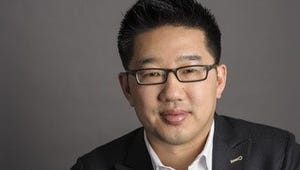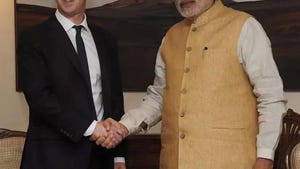Yesterday, the Pope. Today, Zuck.
For the second day in a row, one of the world’s most powerful people visited New York to speak on the world stage.
Facebook CEO Mark Zuckerberg addressed the United Nations twice.
During the 70th annual U.N. General Assembly session, Zuckerberg discussed the “importance of connectivity in achieving the UN’s sustainable development goals.” He then delivered the keynote address at the United Nations Private Sector Forum, where UN Secretary-General Ban Ki-moon and German Chancellor Angela Merkel were also scheduled to speak.
"Connecting the world is one of the fundamental challenges of our generation," Zuckerberg said. "More than 4 billion people don't have a voice online."
Earlier in the day, Zuckerberg and Microsoft co-founder Bill Gates led a high-powered contingent whose goal is to bring Internet access to everyone in the world by 2020 – part of a U.N. effort to eradicate extreme poverty by 2030. UN officials estimate half the world does not have reliable access, especially women and girls, whose education and health is crucial to anti-poverty efforts.
“The Internet belongs to everyone. It should be accessible by everyone,” said a declaration signed by Zuckerberg, Bill and Melinda Gates, U2 lead singer Bono and others. The Bill and Melinda Gates Foundation on Saturday launched its own roadmap, which put a top priority on improving the health and education for girls.
Ban Ki-moon said more than $25 billion has been committed so far to meeting the goals, led by $3.3 billion from the U.S. and pledges from Canada, Germany and Sweden.
The UN visit capped a week in which Zuckerberg – whose company’s service reaches 1.3 billion members worldwide -- has taken on a global leadership role.
After meeting with Chinese President Xi Jinping in the Pacific Northwest earlier in the week, Zuckerberg hosted India Prime Minister Narendra Modi in a town hall. (Zuckerberg visited Modi in India last year.)
As Facebook continues its astonishing growth overseas, it is increasingly training its sights on the world's two most populous countries. China, where Facebook is banned, and India hold vast revenue potential for the social media network, as they do for other large tech companies.
But both countries pose myriad challenges. China's government and highly competitive start-ups have made it rough for any Western company to succeed in that country. India, meanwhile, poses different obstacles: poor infrastructure and charges of corruption.
Follow USA TODAY San Francisco Bureau Chief Jon Swartz on Twitter: @jswartz.
*********************************************


